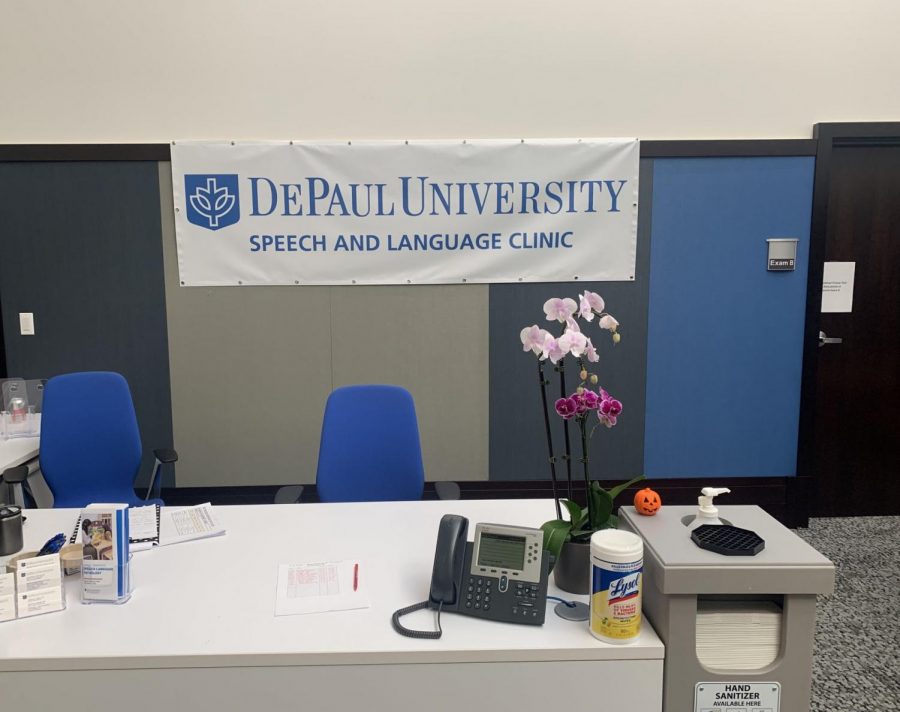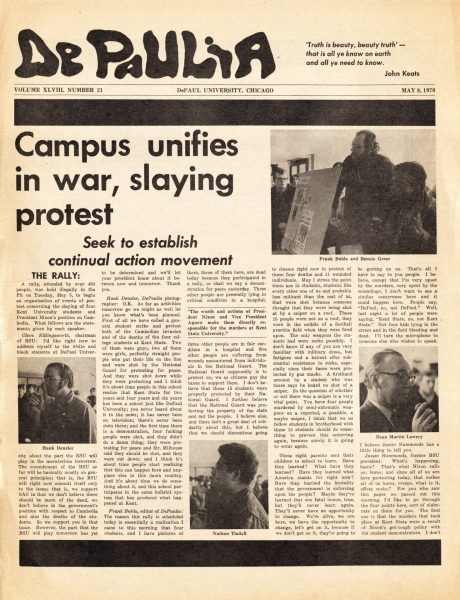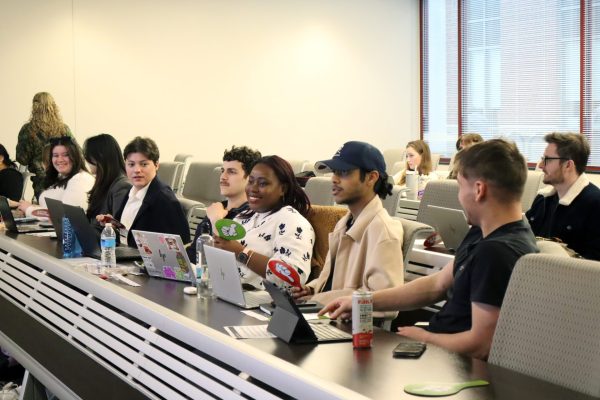New DePaul Speech and Language clinic to serve diverse community of Chicago
The DePaul University Speech and Language Therapy Clinic located in Lincoln Park.
The new DePaul Speech and Language clinic located in Lincoln Park that opened Sept. 23 is embodying the Vincentian mission by providing services to the DePaul community and beyond.
The clinic will not only be providing services but it also houses classrooms and hands-on learning areas for the occupational therapy graduate program set to launch in the fall of 2022. The School of Nursing, as well as the Department of Psychology, will also collaborate on research and learning within the clinic.
Part of increasing diversity and access to the speech and language clinic will be providing services to bilingual families. DePaul will also offer a bilingual English-Spanish certificate program.
Currently, the clinic is accepting screenings and evaluations. Therapy sessions will begin in January 2022.
The clinic will have treatment for the following aspects of communication — fluency, voice disorders, articulations of speech and sound disabilities, swallowing and people who need alternative ways to communicate.
Jayne E. Jaskolski, speech language pathology program director, was hired two and a half years ago to come and build the speech and language pathology program and she is proud of the work the department has achieved.
In efforts to provide equitable access to speech and language services, the clinic will be providing services to all individuals for free. A donation is never required, but if you choose to donate it will continue to support the clinic’s services.
“It’s through the mission of St. Vincent DePaul we are able to create services for the community,” Jaskolski said. “We are able to go and make sure that everyone has access to get these services regardless if they have the ability to pay.”
Jaskolski says speech and language services are expensive and may or may not be covered by someone’s insurance.
“This is a social justice piece, where we want to make sure that all people have the ability to communicate,” Jaskolski said.
According to the 2010 Census, 27.6 percent of the U.S population identified as a minority and 16.3 percent of that identified as Hispanic.
But in the field of speech language pathology only 8.5 percent of pathologists identified as a minority. Of that, only 6.1 percent identify as Hispanic.
“The speech and language program at DePaul is focusing on recruiting diverse students for them to serve the communities they come from,” Jaskolski said.
According to Jaskolski, people are coming from far and wide across the state. People from Crystal Lake and far south to Olympia Field.
“People are contacting the clinic because they are impressed with their mission and bilingual services,” Jaskolski said.
The clinic has also received referrals from Shirley Ryan AbilityLab and the University of Chicago Medicine department.
DePaul students are also contacting the clinic for speech and language services. Theater and music students are coming for therapy to make sure they are using their voice correctly.
Jaskolski sees a great future for students in the speech and language pathology program.
“All of our students are already living within our mission, which is important to us,” Jaskolski said. “My goal is that when our students graduate from here and someone sees our alum, they are going to say, ‘that is a vincentian speech language pathologist.’”
Treasyri Williams Wood, director of DePaul speech and language clinic, says the community response has been incredible.
“We receive daily calls, emails and visitors who express how excited they are that they finally can receive services that are tailored to their needs,” Williams Wood said.
Williams Wood said bilingual services are important in Chicago because of its diverse population.
“Our aim is to increase the cultural humility of our graduate students through living our mission of inclusivity and equity as it relates to service,” she said. “That is the work to be done.”
Williams Wood said she is passionate about her vocation and because she gets to share her experiences with future pathologists.
“I am confident that their curiosity, compassion and tenacity will propel them to go out and change our profession for the better,” Williams Wood said.
Jenifer Marin, graduate student in speech and language pathology, said that as a Colombian American, Marin has experienced the importance of bilingual services first hand.
“My parents who don’t speak English had a lot of trouble going to doctor visits and I would have to go advocate for them,” Marin said. “So having bilingual services where a doctor can meet your needs is really helpful.”
In preparation to provide services to bilingual patients, students in her cohort are taking the required courses for the bilingual program. Students are working with Elia Olivares, who is the director of culturally and linguistically diverse program in speech and language pathology and clinical supervisor of the bilingual program.
“One class that I’m currently taking is diversity and cultural awareness,” Marin said. “I’m learning about being aware of diverse cultures and how to appropriately approach patients.”
As part of preparing to start working in the clinic along with faculty, Marin says she had the opportunity to perform her first screening as a student.
A speech and language screening consists of a 30 minute assessment of a child’s understanding of speech, language and reading and writing abilities. This then makes it possible to identify any problems in order to receive adequate speech and language intervention.
Marin says she has experience working with children. Previously, she was a therapist for children with autism.
“It’s really nice because I get to see their progress,” Marin said. “I worked in the area of early intervention so if children had speech delays I was able to figure out which therapy would be best.”
Since Marin is part of the first cohort of the speech and language pathology graduate program, adjustments are made along the way to set the standard for future classes. So far, she says it’s been motivating to work alongside professors in the program.
“It’s been an honor. They are teaching us everything we need to know to be successful speech and language pathologists,” Marin said. “They are really open to feedback. It feels like we are all working together for the same goal.”
For Marin, it’s a privilege to speak and communicate with patients in Spanish. Helping someone that might feel alone means a lot to Marin.
“This clinic is offering a great opportunity to the bilingual community,” Marin said. “It’s an honor to do what I love but serve a greater purpose as a bilingual speaker in speech and language services.”











